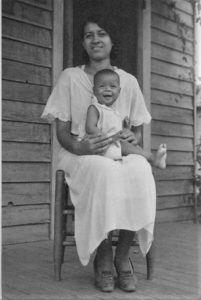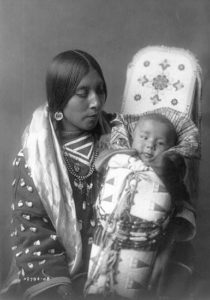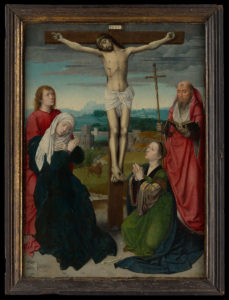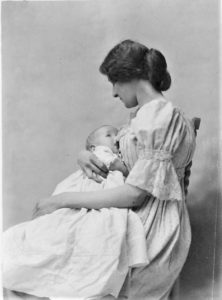Maternity Leave
It tends to be amusing to watch young boys and girls engage in a battle of wits at times over which of the two and only two sexes is better, ranging from sports, to schoolwork, to music, to just about anything.
 A story of a grade school boy comes to mind who once proudly told a girl classmate how she could never become a priest, only for her to quickly retort that he could never become a mother. That pretty much ended the conversation. After all, how could the boy really get an upper-hand on that one? Would he have argued that priests are better than mothers, or that priests don’t need mothers, or that priests don’t have mothers? After all, it was important enough for Our Lord, the High Priest, to have one.
A story of a grade school boy comes to mind who once proudly told a girl classmate how she could never become a priest, only for her to quickly retort that he could never become a mother. That pretty much ended the conversation. After all, how could the boy really get an upper-hand on that one? Would he have argued that priests are better than mothers, or that priests don’t need mothers, or that priests don’t have mothers? After all, it was important enough for Our Lord, the High Priest, to have one.
With Mothers’ Day this past Sunday, and with May Crownings taking place throughout this month of Mary, some words are in order about the noble state of motherhood.
 For many, the image of a mother tends to be an image of selflessness. Even the most rough-and-tumble of people almost always have a soft spot in their hearts for their mothers; the stereotypical tattoo of a heart with the word “MOM” in it, even at the most primal level, is an emblem of and tribute to the sacrifice and self-giving, of love without counting the cost, of forgiveness without question, even despite a mother’s personal faults.
For many, the image of a mother tends to be an image of selflessness. Even the most rough-and-tumble of people almost always have a soft spot in their hearts for their mothers; the stereotypical tattoo of a heart with the word “MOM” in it, even at the most primal level, is an emblem of and tribute to the sacrifice and self-giving, of love without counting the cost, of forgiveness without question, even despite a mother’s personal faults.
Those in prison for actual crimes often lament letting their mothers down because, for some, their mothers are the only experience of unconditional love they have, and the sense of disappointing someone like that is hard to bear.
Once a woman has a baby, no man of worth could ever look at his wife without regarding her now as the mother of his children. Things are different, for in seeing his wife bear the pains of birth, how much more should it inspire him to protect and care for her as he would his own life, because are not the children an extension of his own life? After all, they bear his name and he is commanded to love his wife as Christ loved the Church (cf. Eph. 5:25). And even if a couple is not blessed with children, how can a man not be deeply moved when he sees the motherly instinct show forth in his wife when she takes care of others who are not her own?
 Simply put, motherhood is heroic by nature, and the heroic appeals to every man and inspires him to rise to it as well.
Simply put, motherhood is heroic by nature, and the heroic appeals to every man and inspires him to rise to it as well.
But why is this appeal to the heroic so pronounced in motherhood? It has something to do with how God has equipped a woman for it, leaving nothing in her unaffected – biologically, psychologically, emotionally, spiritually. It is woven into the nature of woman to communicate life, to protect life, and to continue to promote the welfare of that life.
This is most necessary considering what God does when He makes a woman a mother: for when a woman conceives, the new life within is the work of God, she is the essential partner through whom two fathers work, a human and a Heavenly. In a sense, the woman’s body becomes the temple within which God creates new souls that will live forever, souls made to know, love, and serve Him. Assuming the responsibilities for this is where the sacrificial component of motherhood really comes into play and where a mother must strive to find her fulfillment.
To quote Ven. Fulton Sheen:
In a mother, two of the great spiritual laws are united into one: love of neighbor and cooperation with God’s grace – and both are applied in a unique way. For love of neighbor, to anyone except a mother, is a love of a non-self; a mother’s neighbor during pregnancy is one with herself, yet to be loved differently than the self. The sacrifice involved in neighborly love now takes place within her flesh; the agent and the object of her sacrifice are both contained within her. […] This is why women have a surer understanding of the doctrine of redemption than men have: they have come to associate the risk of death with life in childbirth, and to understand the sacrifice of self to another through the many months preceding it.
When motherhood is understood like this, it is evident why a woman would respond as she does in generously accepting the children God sends and laboring tirelessly for their welfare: in carrying her children and giving birth to them, or by adopting them as her own, she should receive a greater veneration for the Source of her own life. Collaborating with God, she brings God to man in the creation of a new life, and she brings man to God by giving birth to that new life. It certainly sounds priestly in some analogous way.
 So when Sacred Scripture depicts Motherhood par excellence standing at the foot of the Cross, every aspiring mother must find her find inspiration there.
So when Sacred Scripture depicts Motherhood par excellence standing at the foot of the Cross, every aspiring mother must find her find inspiration there.
Indeed it is a formidable tide for women to swim against nowadays, but it can and must be done – how many souls could be counting on it, and how many women who are wandering are in need for that example? We all know how modern society tries to destroy motherhood: immodesty, promiscuity, trashy romance on the screen, contraception in and out of marriage, cohabitation, abortion, unnatural behavior – all of this is anti-mother, and is at the core of both moderate and radical feminism which seeks to destroy women by “freeing” them from the inclination to motherhood and life that their God-given femininity draws them.
The Blessed Virgin is hated by hell because she is a Mother, and because hell is well-aware of the exalted place God has given motherhood in the redemption of humanity as a whole, and the place He continues to give motherhood in the redemption of each one of us.
After all, is it not from our mothers, long before we understood words, that we learn of God and His love for us? Is not motherhood in its own way a real continuation of Calvary from where we all receive the life of grace? Is not our Lady’s own vigil at the foot of the Cross the prototype of every mother’s vigil, whether it be at the bedside of a sick child or in her constant prayers for her wandering children?
How fitting then for our Lord to bequeath His own Mother to us from the Cross: Woman, behold thy son (Jn. 19:26).
This is why we crown and confess our devotion to Mary throughout her month, for she inspires the heroic within us all when it comes to doing God’s work, which is exactly what dedicated family life is.

But the heroic is not difficult all the time. Such would be unsustainable. Amidst trials, our Lady enjoyed the quiet of Nazareth in the company of Jesus and St. Joseph.
And God grants those quieter moments to all. Perhaps a father should find one in seeing his wife cuddling their children. A mother should find one in that loving word or gesture of support from her husband.
And all of us should find one and smile when we see a mother tending to her child – because that is exactly when God does.
May 10, 2021








